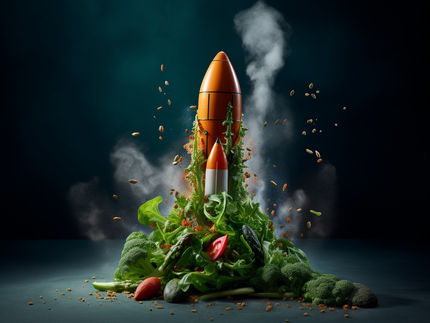Artificial Carbohydrates for Sustainable Food Production
Heidelberg scientists run model calculations for synthetic sugar production
Advertisement
What alternatives to conventional agriculture exist to produce carbohydrates for food and feed? Scientists at Heidelberg University performed model calculations for artificial sugar production with a view towards synthesis of other carbohydrates such as starch. They are looking into whether a part of the human calorie requirement could be met by resource-saving, synthetically produced foods. In their study, Prof. Dr Ulrich Platt and Dr Florian Dinger of the Institute of Environmental Physics at Ruperto Carola take advantage of commercially available technologies to calculate energy use, land area, and costs in an attempt to raise awareness and research interest in these technological options.
“Conventional agriculture is at an impasse. Its success notwithstanding, the environmental costs of land and water consumption, pesticides, and massive amounts of artificial fertilisers are severe,” explains Prof. Platt. The researchers believe one way to circumvent this damage would be to manufacture artificial carbohydrates from atmospheric carbon dioxide and water, using renewable energies such as photovoltaics. “All the required technology is either commercially available, or in the case of sugar, at least developed on a lab scale. As yet, however, no directed research has been conducted towards industry-scale carbohydrate synthesis because biogenic carbohydrate production was economically more competitive. The expected drop in costs for electrolytic production of hydrogen would determine when synthetic sugar would reach a competitive price point,” explains Dr Dinger.
Yet lower synthesis costs alone do not make synthetic sugar competitive; the ‘true costs’ of conventional agriculture must also be taken into account, add the Heidelberg researchers. They estimate the actual cost of biogenic sugar production to be three times higher than today’s market price when the ecological and socio-economic damage is factored in. “One major cost driver is the massive amounts of water used in conventional agriculture. Because ground water reservoirs in semi-arid regions such as California and India are dwindling, agricultural operations over the long term will probably have to resort to using much more expensive water from desalination plants,” states Ulrich Platt.
According to the researchers, synthetic products could potentially cover a major portion of human calorie requirements. They could also be used as feedstock for microorganisms, fungi, or livestock in order to enhance the sustainability of the remaining biogenic production of fats and proteins. As a way forward, the Heidelberg researchers recommend a balance of synthetic and biogenic production to achieve a secure and sustainable source of food. According to their data, producing artificial carbohydrates on an industrial scale will need far less land, water, and energy. For the long term, they believe it possible to fully convert over to synthetic sugar production. “Technology permitting, all processed foods such as bread and noodles should also be produced in part from synthetic starches and fats. Conventional agriculture would continue to produce fruit, vegetables, and meat,” adds Prof. Platt.
The research results were published in the journal “Frontiers in Sustainable Food Systems”.

couleur/ Pixabay



























































